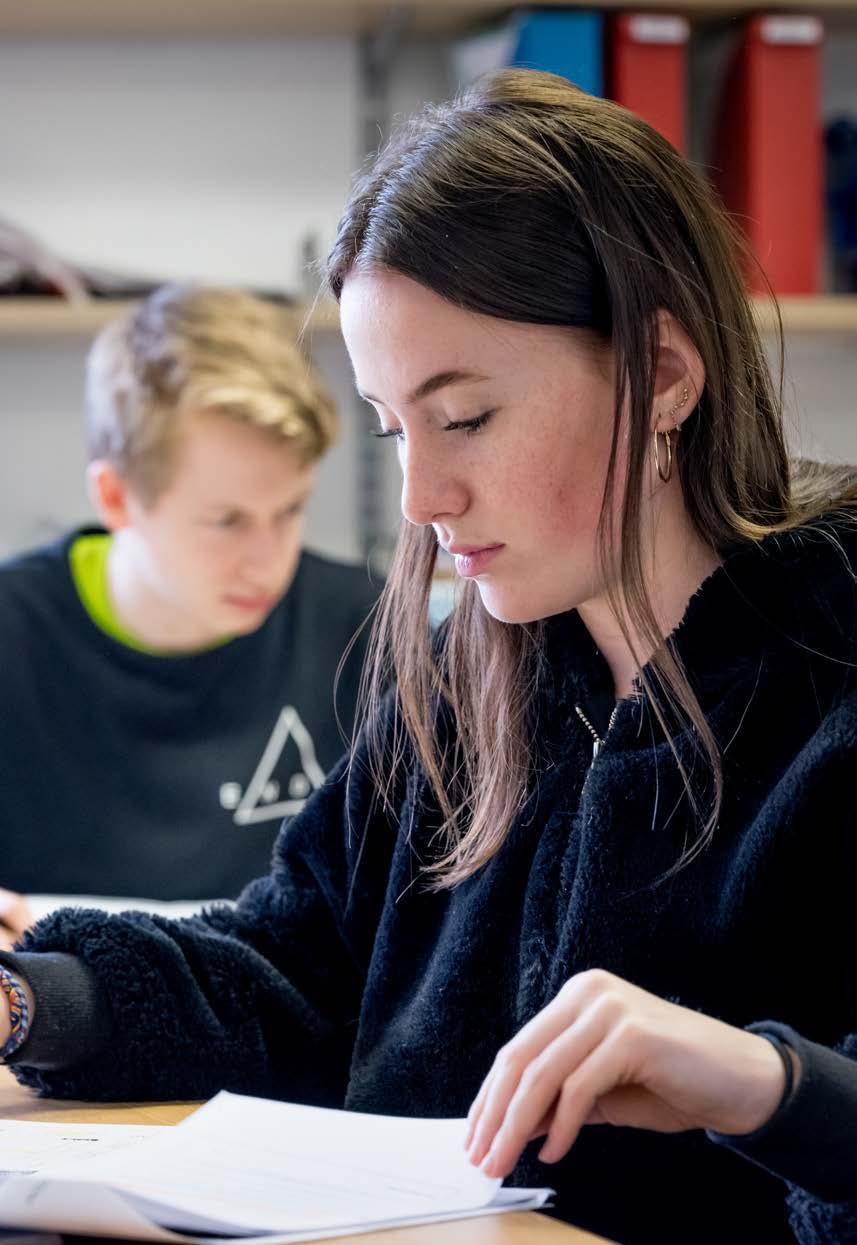
11 minute read
Spanish
EXAM BOARD: AQA
Entry requirements:
Levels 7-9 in Spanish GCSE are required to access the syllabus confidently.
Extra information:
Each year we enter students into the Hispanic Theatre Festival at North London Collegiate School. One of the highlights for most students is the annual language and cultural enrichment trip to Salamanca. In addition to these students are given the opportunity to participate in: • The fortnightly Spanish Debate club • The Stephen Spender translation competition • Outings to A level Spanish conferences • Outings to the BFI for student conferences regarding
Spanish film • Theatre performances in Spanish in London (depending on what is currently showing)
Head of department:
Camilla Parsons
In our increasingly globalised world, communicating in another language, learning about the political aspects of another country and having an understanding of a country’s society, literature and culture are invaluable. Spanish is an exciting and challenging course that combines all of the above.
During the course, you will learn to communicate and debate on current affairs, politics and socioeconomic issues related to Spain and the Spanish-speaking world. You will learn a lot about cultural references, the arts and the literature in the Hispanic world combined with the in-depth study of a film and a set text.
The course is very interactive and you will have the opportunity to develop your knowledge and language skills through a variety of different mediums such as TV, music, the internet and authentic texts. As well as topic-based lessons and weekly grammar lessons, you will improve your fluency and pronunciation in small groups as well as in 1:1 sessions with your subject teacher. Studying a language at A level leads to a range of career opportunities. Students who have studied languages go on to have careers in a variety of sectors including teaching, translating, sales and marketing, travel & tourism, journalism, fashion, work in the foreign office or secret service, interpreting and banking.
Spanish extends beyond the classroom at King Alfred and a number of extra-curricular activities are on offer. This includes an annual trip to Salamanca and a Spanish Debating Club run fortnightly.
Assessment
Assessment takes place at the end of the two year course.
UNITS: Paper 1: Listening
Type of assessment - Listening, reading, writing and translation reading and writing Duration - 2 hours 30 minutes Weighting - 50%
Paper 2: Writing
Type of assessment - Writing on a film and one set text Duration - 2 hours Weighting - 20%
Paper 3: Speaking
Type of assessment - Individual research project presentation and discussion followed by a discussion on one of the four sub-themes studied throughout the course. Duration - 21-23 minutes Weighting - 30%
THEATRE STUDIES
EXAM BOARD: EDEXCEL
Entry requirements:
GCSE 6/7 English or Drama.
Extra information:
We pride ourselves on running lots of different productions, trips, competitions and workshops that you can get involved in. These include but are not limited to:
• The Senior School Show • School Shakespeare • ISTA (International Schools Theatre Association)
Festivals in Europe • New Views. National Theatre Playwriting
Competition • Theatre Trips • Drama Workshops • Masterclasses • Audition Technique Classes
Head of department:
Lucy Hall
We want students to have an inspiring experience of A level Drama and Theatre.
This qualification emphasises practical creativity alongside research and theoretical understanding. Students learn through experience, seeing theatre and making theatre for themselves. Students are introduced to a wide range of theatrical styles and contexts as they explore plays practically, devise and work on performances. Students can choose to develop as a: Performer; Designer (lighting, sound, set, costume, puppets); Director; Combination of these.
There will be appropriate enrichment activities over the two years including masterclasses, workshops and outings to enhance student learning. Whichever option they choose, students will gain many invaluable skills, both theatrical and transferable, to expand their horizons.
This is an exciting course which is accepted by all universities as an entrance qualification. The course demands practical, creative and communication skills in almost equal measure meaning students are prepared for university and beyond.
Assessment Component 1: Drama & Theatre
• Written exam of 3 hours / Open book / 80 marks / 40% of A level • Section A: 1 question from a choice of set plays from List A (25 marks) • Section B: question on a given extract from one of set plays from List B (30 marks) • Section C: One question on the work of theatre makers in a single live theatre production (25 marks)
Component 2: Creating Original Drama (Practical)
• The creating and performing devised drama influenced by the work of one prescribed practitioner • Working notebook (40 marks) / Devised performance (20 marks) • 60 marks in total / 30% of A level • Marked by teachers & moderated by AQA • (postal moderation from requested sample)
Component 3: Making Theatre (Practical)
• Practical exploration & theatrical interpretation of three extracts (extracts 1,2 & 3).
• Methodology of a prescribed practitioner must be applied to extract 3
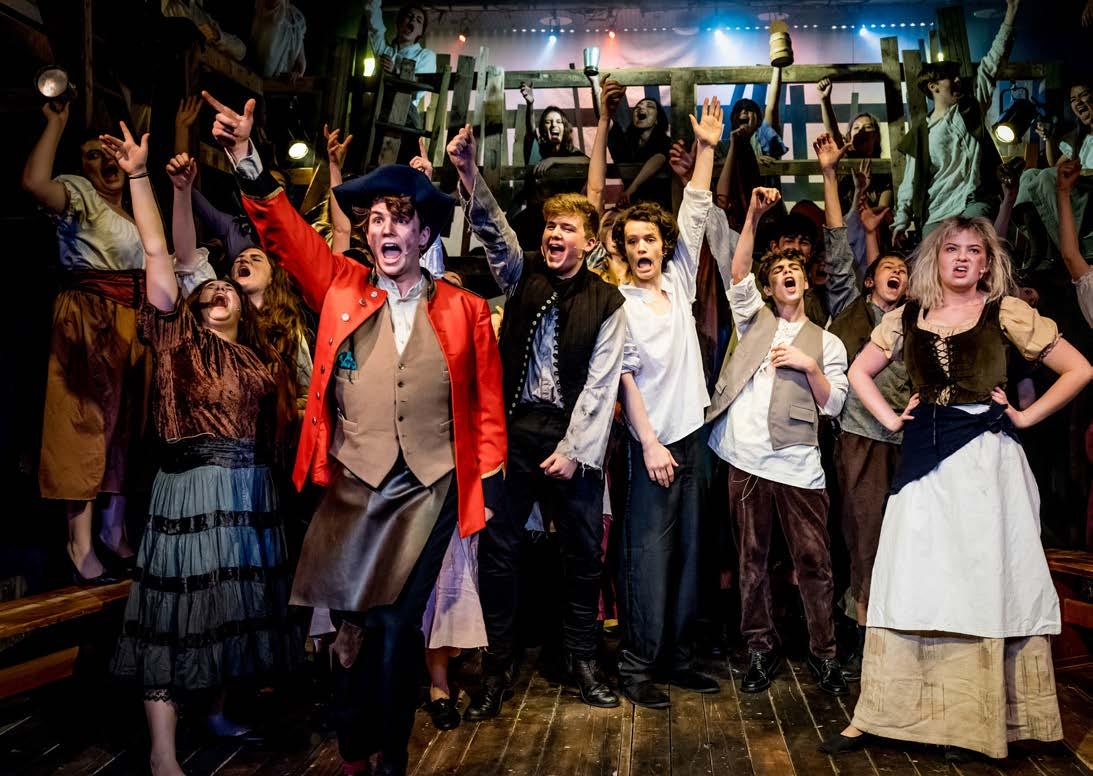
• Performance of extract 3 (40 marks) / Reflective report (20 marks)
• 60 marks in total / 30% of A level
• Marked by AQA (visiting examiner)
THREE DIMENSIONAL DESIGN (ART & DESIGN)
EXAM BOARD: WJEC - EDUCAS
Entry requirements:
Ideally, DT at GCSE but students who have only studied Art will also be considered. Basic skills needed include ICT, CAD, sketching, modelling and researching, all of which are developed on the course. Students will also need to be familiar with workshop practice and have a basic grounding in the use of hand tools and workshop machinery.
Head of department:
Miranda Socratous
A course in 3D Design offers a unique opportunity within the curriculum for candidates to identify and solve real world problems. Using insights to gain an understanding of their user, they design and then manufacture solutions to a wide range of human centred project contexts. This will relate to an area of the candidates personal design interest and can include architecture, furniture design, environmental design, jewellery, interaction design and product design, too name but a few of these potential areas to specialise in.
This A level course is intended to be of interest to candidates with a real passion for design and is suitable for those students wanting a career in design or associated areas. The program of study is based entirely on coursework and has a focus upon being ‘hands on’, proactive, independent learning with the ability to ‘think through making’ at the heart of its pedagogy.
In the first-year students will take part in a range of projects that build their subject specific knowledge, skills and understanding. In the final year of the course students will complete two units of work for the A level award.
Assessment Component 1: Personal Investigation (60%)
The Personal Investigation - two integrated parts: A major in-depth critical, practical and theoretical investigative project and outcomes based on themes and that have personal significance;
An extended written element of 1000 words minimum, which may contain images and texts and must clearly relate to practical and theoretical work using an appropriate working vocabulary and specialist terminology.
Component 2: Externally Set Assignment (40%)
Part 1 & 2: Preparatory study period and 15 hours sustained focus work Externally set assignment. Responses take the form of critical, practical and theoretical preparatory work/supporting studies, which inform the resolution of ideas in the 15 hours sustained focus study. Planning has to relate to the outcomes. The department has two extremely well equipped “university level” workshops and two design studios with the latest CAD/CAM. There is a blacksmith’s forge and outdoor project works. There are trips to design weeks and graduate shows. The department also has excellent links with Eindhoven’s Design Academy and Northumbria University, considered two of the best HE Design courses in the world.
EXAM BOARD: UNIVERSITY OF THE ARTS LONDON (UAL)
Entry requirements:
It is recommended that students have a minimum of 4 x GCSE’s at grade 4 or above, at least one of which should be in a Performing Arts subject. Music or Dance grades of the appropriate level may also be considered as suitable entry qualifications.
Head of department:
Lucy Hall
This Level 3 Extended Diploma is an alternative route at post GCSEs. Moving away from a more traditional route of study, this vocational course in performance has been designed to provide students with the skills, knowledge and understanding of a wide range of performance and production disciplines.
Over the two years, there will be many exciting opportunities to perform; including singing showcases, music concerts, drama performances and fullscale productions.
Lessons are taught practically, although students are expected to research and record their own progress through log books and in feedback sessions.
This rigorous course mean that students have to be equally energised and committed to developing both their practical skills and academic appreciation of the arts.
At the end of their two year training students will be well equipped to start their own career in the Performing Arts Industry or alternatively go on to study at University or Drama School.
Assessment
Students are assessed through rehearsals, practical performance, reflective journals (audio/ video and written) and evaluations. Independent research is moderated and written work is only set in order to aid progression and development throughout the programme.
Continuous formative assessment is given throughout each project, this is made up of verbal feedback, teacher observations and tutor 1-2-1. At the end of each project each student receives a formal summative assessment that will be kept on record. It will highlight how the student has met/is exceeding each unit’s assessment criteria as outlined in the UAL specification.
To achieve a PASS in any unit - all assessment criteria must be met. Units 8 and 12 are assessed and graded PASS, MERIT or DISTINCTION. Failure to meet assessment criteria will lead to a referral. Students are allowed ONE opportunity to redeem a referral.
UCAS Points
The UAL Level 3 Extended Diploma in Performance and Production Arts is included in the UCAS tariff and attracts tariff points : PASS 72 / MERIT 120 /
DISTINCTION 168
HOW TO APPLY
Sixth Form Bursaries
A small number of Bursaries are available. For more information please contact the Bursary Manager on 020 8457 5209.
External applicants
Each year we take up to 20 new students into the Sixth Form from a range of other schools.
Students are encouraged to attend one of two Sixth Form Open Evenings in the Autumn Term prior to entry.
In general, external applicants are required to achieve at least five GCSE passes at grade 6 (or equivalent), or above (as required by individual subjects), for entry into our A level courses. The requirements for the Performing Arts Diploma are four GCSE passes at grade 4 or above, one in a Performing Arts subject. The specific GCSE requirements for entry are listed on the subject pages.
The vast majority of students at KAS study three subjects at A level (the EPQ would be additional).
The Application Process
Applicants are asked to complete the ‘Entry at 16’ application form on the website: www.kingalfred.org.uk
Whilst completing the form you will be asked to upload a copy of the last full school report, predicted GCSE results, GCSE mock results and any other relevant reports. Students are invited to complete the section on the form or submit a letter outlining their reason for applying to The King Alfred School. We will contact the current school for a reference.
The Interviews
Successful applicants are invited to attend for half a day, which includes interviews with Heads of Departments and senior staff, written assessments, and meeting KAS Sixth Form students. Parents are invited to meet with senior staff, after the interview day. Places are offered on the basis of the interview day. Each year we have two interview days, one in the November preceding entry, and one in the January. An equal number of places will be available for both interview days.
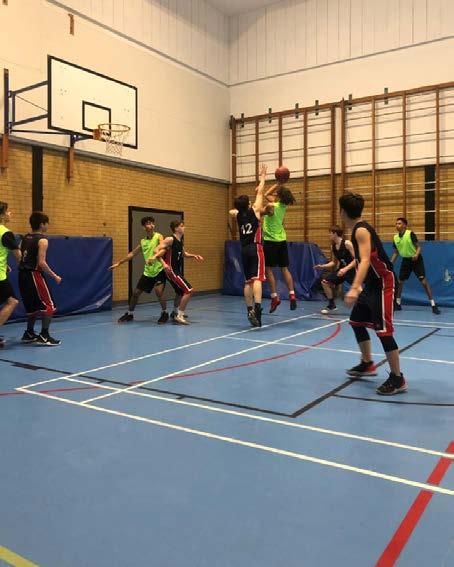
When Harriet was given the part of Betty Rizzo in a KAS production of Grease, she was shocked, scared and decided there was no way she could stand on stage and sing three solos.
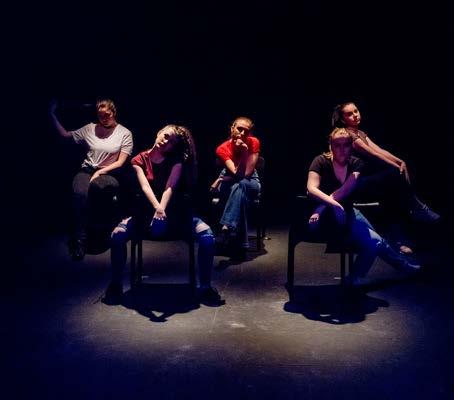
But she did. And she did it brilliantly. Her confidence soared and whilst serious drama (specifically period pieces from the 20s and murder mysteries) is where her love lies, now she has musical theatre firmly under her belt too.
Harriet is in Year 12 and as well as doing the UAL course because of her love of drama, she is also studying photography. Coming from a thespian family, acting has always been in her veins. But photography was something she discovered at KAS and she has never looked back. She says she now sees everything differently - she notices buildings, nature, people - and is always shooting (even with just her phone) and editing.
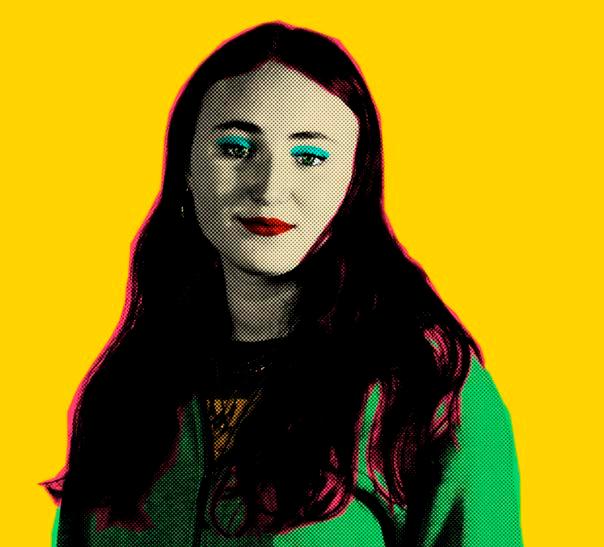
Harriet plans to either go to drama school or to university to study Photography but ultimately would like to combine both her passions.
“I came to KAS in Year 5 from another school and have never looked back. KAS gave me the freedom and the independence to discover what I enjoy most and encouraged me to develop in areas I never thought I could - musical theatre is a great example of that. I have grown in confidence because of the faith and support KAS has shown me and, as a result, I feel much less self conscious and vulnerable and more self assured.”
The King Alfred School, North End Road, London NW11 7HY
www.kingalfred.org.uk Tel: 020 8457 5200 Email: kas@kingalfred.org.uk Design by Sparkloop




